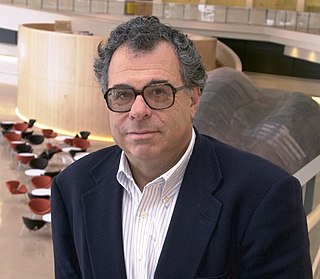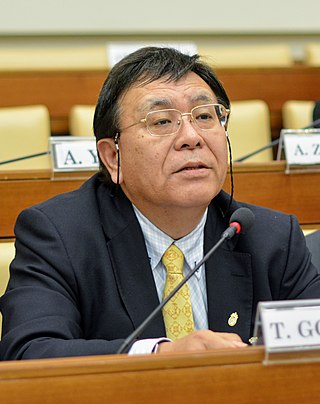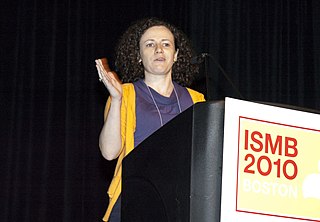Related Research Articles

DNA profiling is the process of determining an individual's DNA characteristics. DNA analysis intended to identify a species, rather than an individual, is called DNA barcoding.
Warren John Ewens is an Australian-born mathematician who has been Professor of Biology at the University of Pennsylvania since 1997. He concentrates his research on the mathematical, statistical and theoretical aspects of population genetics. Ewens has worked in mathematical population genetics, computational biology, and evolutionary population genetics. He introduced Ewens's sampling formula.
Sir Peter James Donnelly is an Australian-British mathematician and Professor of Statistical Science at the University of Oxford, and the CEO of Genomics PLC. He is a specialist in applied probability and has made contributions to coalescent theory. His research group at Oxford has an international reputation for the development of statistical methodology to analyze genetic data.

David Botstein is an American biologist serving as the chief scientific officer of Calico. He served as the director of the Lewis-Sigler Institute for Integrative Genomics at Princeton University from 2003 to 2013, where he remains an Anthony B. Evnin Professor of Genomics.

In population genetics, the Balding–Nichols model is a statistical description of the allele frequencies in the components of a sub-divided population. With background allele frequency p the allele frequencies, in sub-populations separated by Wright's FSTF, are distributed according to independent draws from

Ranajit Chakraborty was a human and population geneticist. At the time of his death, he was Director of the Center for Computational Genomics at the Institute of Applied Genetics and Professor in the Department of Forensic and Investigative Genetics at the University of North Texas Health Science Center in Fort Worth, Texas. His scientific contributions include studies in human genetics, population genetics, genetic epidemiology, statistical genetics, and forensic genetics.

David Haussler is an American bioinformatician known for his work leading the team that assembled the first human genome sequence in the race to complete the Human Genome Project and subsequently for comparative genome analysis that deepens understanding the molecular function and evolution of the genome.

DNAPrint Genomics was a genetics company with a wide range of products related to genetic profiling. They were the first company to introduce forensic and consumer genomics products, which were developed immediately upon the publication of the first complete draft of the human genome in the early 2000s. They researched, developed, and marketed the first ever consumer genomics product, based on "Ancestry Informative Markers" which they used to correctly identify the BioGeographical Ancestry (BGA) of a human based on a sample of their DNA. They also researched, developed and marketed the first ever forensic genomics product - DNAWITNESS - which was used to create a physical profile of donors of crime scene DNA. The company reached a peak of roughly $3M/year revenues but ceased operations in February 2009.

Takashi Gojobori is a Japanese molecular biologist, Vice-Director of the National Institute of Genetics (NIG) and Distinguished Professor at Center for Information Biology and DNA Data Bank of Japan (DDBJ) in NIG, Mishima, Japan. He has also been co-appointed as the Special Research Consultant of the National Institute of Advanced Industrial Science and Technology (AIST), as a Visiting Professor of Keio University, University of Tokyo, and Tokyo Institute of Technology and as a Visiting Research Director of RIKEN.
Richard Mott is Weldon Professor of Computational and Statistical Genetics in the research department of Genetics, Evolution and Environment at University College London. He was previously at the Wellcome Centre for Human Genetics and a Professor by Research at Oxford University.
Clark N. Glymour is the Alumni University Professor Emeritus in the Department of Philosophy at Carnegie Mellon University. He is also a senior research scientist at the Florida Institute for Human and Machine Cognition.
Ziheng Yang FRS is a Chinese biologist. He holds the R.A. Fisher Chair of Statistical Genetics at University College London, and is the Director of R.A. Fisher Centre for Computational Biology at UCL. He was elected a Fellow of the Royal Society in 2006.

Olga G. Troyanskaya is a Professor in the Department of Computer Science and the Lewis-Sigler Institute for Integrative Genomics at Princeton University and the Deputy Director for Genomics at the Flatiron Institute's Center for Computational Biology in NYC. She studies protein function and interactions in biological pathways by analyzing genomic data using computational tools.

Aviv Regev is a computational biologist and systems biologist and Executive Vice President and Head of Genentech Research and Early Development in Genentech/Roche. She is a core member at the Broad Institute of MIT and Harvard and professor at the Department of Biology of the Massachusetts Institute of Technology. Regev is a pioneer of single cell genomics and of computational and systems biology of gene regulatory circuits. She founded and leads the Human Cell Atlas project, together with Sarah Teichmann.

Alicia Yinema Kate Nungarai Oshlack is an Australian bioinformatician and is Co-Head of Computational Biology at the Peter MacCallum Cancer Centre in Melbourne, Victoria, Australia. She is best known for her work developing methods for the analysis of transcriptome data as a measure of gene expression. She has characterized the role of gene expression in human evolution by comparisons of humans, chimpanzees, orangutans, and rhesus macaques, and works collaboratively in data analysis to improve the use of clinical sequencing of RNA samples by RNAseq for human disease diagnosis.

Rebecca Nicole Johnson is an Australian scientist (geneticist) and science communicator. Since April 2015, Johnson has been Director and Chief Scientist of the Australian Museum Research Institute (AMRI), Sydney, the first female to be appointed to the role since the establishment of the Australian Museum in 1827. She is also head of the Australian Museum's Australian Centre for Wildlife Genomics, a wildlife forensics laboratory based at the Australian Museum.
Alicia Laura Carriquiry is a Uruguayan statistician. She is a distinguished professor of statistics at Iowa State University, and was president of the International Society for Bayesian Analysis in 2001. Her research applies Bayesian statistics to nutrition, genomics, forensics, and traffic safety.
Kathryn M. Roeder is an American statistician known for her development of statistical methods to uncover the genetic basis of complex disease and her contributions to mixture models, semiparametric inference, and multiple testing. Roeder holds positions as professor of statistics and professor of computational biology at Carnegie Mellon University, where she leads a project focused on discovering genes associated with autism.
Keith A. Crandall is an American computational biologist, bioinformaticist, and population geneticist, at George Washington University, where he is the founding director of the Computational Biology Institute, and professor in the Department of Biostatistics and Bioinformatics.

Peter Matthias Schneider is a German forensic geneticist. He is a full professor at the Institute of Legal Medicine of the University of Cologne.
References
- ↑ "MIG Home". Melbourne Integrative Genomics (@MelbIntGen). 19 December 2017. Retrieved 9 July 2018.
- ↑ "United Kingdom". www.ucl.ac.uk. Retrieved 9 July 2018.
- ↑ "Handbook of Statistical Genetics, 4th Edition". Wiley.com. 1 September 2019. Archived from the original on 8 October 2019. Retrieved 8 October 2019.
- ↑ Balding, David J.; Steele, Christopher D. (24 June 2015). Weight-of-Evidence for Forensic DNA Profiles. doi:10.1002/9781118814512. ISBN 9781118814512.
- ↑ National Research Council (US) Committee on DNA Forensic Science: An Update (1996). "The Evaluation of Forensic DNA Evidence", National Academies Press. National Academies Press (US). ISBN 9780309053952. PMID 25121324.
- ↑ "REPORT TO THE PRESIDENT Forensic Science in Criminal Courts: Ensuring Scientific Validity of feature-Comparison Methods Executive Office of the President President's Council of Advisors on Science and Technology" (PDF).
- ↑ David Balding, https://www.science.org.au/fellowship/fellows/professor-david-balding